In today's fast-paced world where everyone is busy with their own set of priorities, finding a mutually convenient time to meet can be quite a challenge. That's why the phrase 'meeting at your convenience' has become increasingly popular in modern communication, whether it's for business or personal purposes. It's a polite way of saying 'let's schedule a time that works well for you' without causing any undue inconvenience or difficulty. In essence, meeting at your convenience is all about demonstrating respect for someone's time and schedule while still achieving the desired outcome through effective communication and collaboration. So, if you're looking to schedule a meeting with someone, consider using this simple phrase to ensure a successful outcome.
What Does It Mean When Someone Reply at Your Convenience?
It signals that you value their time and that you’re willing to be flexible with your schedule to accommodate them. When someone replies with “at your convenience” it implies that they’re willing to work with you and make sure that the meeting time is mutually convenient. This phrase is commonly used in professional settings where efficiency and productivity are highly valued.
A typical exchange might go something like this: “Hi, I was wondering if we could schedule a meeting to discuss the new project. When would be a good time for you?”. The other person might reply with something like, “Thank you for reaching out. Im quite busy at the moment, but Im happy to meet with you at your convenience. Could you please suggest a few dates and times that work for you?”
It also implies that the other person is open to scheduling the meeting whenever it’s most convenient for you, rather than forcing you to rearrange your schedule to meet their needs.
It signals that you’re willing to work with others to find mutually agreeable solutions, which is an important skill both in the workplace and in personal relationships. Whether you’re the one using this phrase or the one receiving it, it’s a positive sign that signals a willingness to collaborate and make things work.
Examples of Situations Where “At Your Convenience” Might Be Used, Such as Job Interviews, Client Meetings, or Doctor Appointments.
- Job interviews
- Client meetings
- Doctor appointments
- Scheduled phone calls
- Meetings with colleagues
- Personal consultations
- Site visits
- Tours of facilities
- Training sessions
- Project reviews
In professional and personal communication, using clear and specific language is essential. But what about phrases like “for your convenience”? While it may seem like a courteous phrase, there are some nuances to consider. Let’s explore this further.
Is Saying for Your Convenience Rude?
The phrase “for your convenience” is often used in the service industry. For example, a hotel may offer guests “complimentary breakfast for your convenience” or a store may have a “no-questions-asked, return policy for your convenience.”. The intention is to make the customer feel valued and catered to, which can lead to repeat business.
However, in some cases, the phrase may come across as insincere or even passive-aggressive. For example, if a customer is complaining about a delayed shipment and the representative responds with “we apologize for the inconvenience,” it may be seen as dismissive. Similarly, if someone is asking for a favor and the response is “I”ll do it for your convenience,” it may imply a lack of enthusiasm or willingness to help.
Ultimately, the tone and context in which the phrase is used will determine whether it comes across as polite or disrespectful. If used genuinely and in a way that shows empathy and a desire to help, it can be an effective communication tool. However, if used flippantly or insincerely, it may do more harm than good.
Whether or not saying “for your convenience” is rude depends on the context in which it’s used and the tone of the speaker. Ultimately, it’s important to consider the cultural expectations and norms when communicating in any language.
Other Commonly Used Phrases in the Service Industry That Have Similar Effects as “For Your Convenience.”
- As a courtesy…
- To better assist you…
- We’re happy to…
- To make things easier…
- For your benefit…
- We understand your busy schedule…
- In order to streamline…
- As a way to enhance…
- To simplify the process…
- As a value-added service…
Source: Is it polite to say “at your earliest convenience”? – Quora
Now that we understand the proper way to use “at your convenience”, let’s explore other common phrases that may not be as polite or grammatically correct.
Is It Correct to Say at Your Convenience of Time?
It’s commonly used in settings where one person is requesting something from another person, such as scheduling a meeting or asking for a favor. Using this phrase shows that you’re considerate of the other persons schedule and are willing to be flexible to accommodate their needs.
However, it’s important to note that this phrase shouldn’t be used as a way to avoid making a decision or committing to a specific time. If a specific deadline or time frame is necessary, it’s important to communicate this clearly and work together to find a solution that works for everyone.
Using the phrase “at your convenience” can also be seen as a sign of respect and deference to someone in a position of authority. It shows that you’re willing to work around their schedule and prioritize their needs.
In professional settings, it’s often used in emails or during phone conversations to arrange meetings or schedule appointments. It’s also commonly used in customer service interactions as a way to offer flexibility to customers who may have busy schedules.
It’s important to use this phrase appropriately and in the right contexts to avoid any confusion or miscommunication.
Alternatives to “At Your Convenience” in Professional Contexts
“When proposing a meeting time or deadline, consider using alternative phrases such as ‘when would be a good time for you?’ or ‘what works best for your schedule?’ instead of the common phrase ‘at your convenience’ to avoid potentially vague or overly casual language.”
It’s important to communicate effectively and politely when setting up meetings or appointments. One way to do this is to offer flexibility and accommodate the other person’s schedule. However, there are various ways to phrase this request without sounding robotic or insincere. Let’s explore some alternative options for suggesting meeting times that feel natural and genuine.
How Do You Say We Can Meet at Your Convenience?
In todays fast-paced world, communication can often feel rushed or even impersonal. However, when it comes to requesting a meeting with someone, it’s important to maintain a certain level of politeness. One common way to do this is by using the phrase “at your convenience.”. By doing so, you aren’t only showing respect for the other persons time and schedule, but also indicating that you’re flexible and willing to work around their availability.
When using the phrase “at your convenience,” it’s important to remember that this isn’t a command or demand. Rather, it’s an invitation that should be phrased as a request. Expressing your desire to meet and asking the other person to select a time that works best for them shows that you value their input and are committed to finding a mutually beneficial time to discuss whatever it’s you need to discuss.
Remember that this is a request, not a command, and be open to alternative options if the other person is unable to meet at the requested time. By employing this polite and considerate language, you can ensure a productive and positive interaction with your colleagues, friends, or anyone else you wish to meet with.
Tips for Scheduling a Meeting Across Different Time Zones
When scheduling a meeting across different time zones, there are several things to keep in mind to ensure that everyone can attend at a convenient time. First, be mindful of the time differences and try to schedule the meeting during normal business hours for all parties involved. Use online tools and calendars to help with time zone conversions and to find time slots that work for everyone. Be sure to communicate clearly and provide a clear schedule and confirmation of the meeting time and time zone. Finally, be flexible and willing to make adjustments as needed to accommodate everyone’s schedules.
Now that we’ve covered different ways of saying “at your convenience,” let’s take a look at some other phrases you can use to communicate the same idea. By using a variety of these phrases, you can keep your communication fresh and avoid repeating the same phrase too often. Let’s explore some other options.
What Is Another Way of Saying at Your Convenience?
When it comes to making plans or scheduling appointments, it’s important to be courteous and respectful of the other partys time. One way to convey this consideration is to offer to meet “at your convenience.”. However, sometimes it may be necessary or preferable to use a different phrase or word to express this same sentiment.
One alternative to “at your convenience” is “whenever.”. This word is simple and straightforward, conveying that the other party has the flexibility to choose a time that works best for them. Another option is “whenever it suits you,” which adds the element of personal preference and comfort to the equation.
For a more relaxed or unhurried tone, “unhurriedly” may be a good choice. This phrase conveys that there’s no rush or pressure for the other party to choose a time, and that they can take their time to find a suitable slot. “In due course” also achieves a similar effect, with the added implication that the other party will be getting back to the speaker on their own timeline.
If the focus is on finding a time that’s most practical or efficient for both parties, “when convenient” or “at a convenient time” may be useful. These phrases indicate that the speaker is open to working around the other partys schedule, while also acknowledging that there may be mutually agreeable times that work better than others. Finally, “at any time” or “at a time that suits you” offer a broad range of options for the other party to choose from, indicating that flexibility is key and that the speaker is willing to work around a wide variety of potential schedules.
The Importance of Considering Time Zones and Scheduling Conflicts When Offering to Meet “At Your Convenience” or Other Phrases
When suggesting a meeting “at your convenience,” it’s essential to consider time zones and potential scheduling conflicts. Not everyone may be available at the same times, and suggesting availability without accounting for these factors can create unnecessary complications. By being mindful of time zones and scheduling, you can make the process of organizing a meeting more straightforward and convenient, ensuring that everyone involved is on the same page.
Conclusion
In conclusion, the phrase "at your convenience" denotes a level of flexibility and accommodation in scheduling a meeting. It conveys the message that the other person's time and effort are valued and that the meeting will be arranged at a time that suits them best. This phrase promotes a positive and respectful communication style, which is essential for building meaningful and productive relationships. By agreeing to meet at someone's convenience, you’re demonstrating your willingness to work together and collaborate effectively to achieve your goals. So, next time someone offers to meet at your convenience, take it as a sign of goodwill and seize the opportunity to connect and engage with them in a meaningful way.






